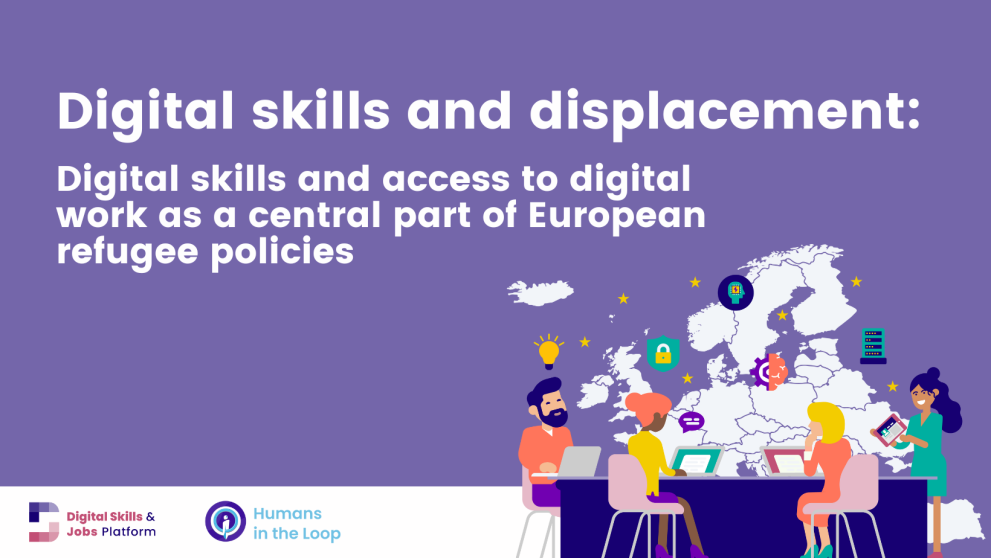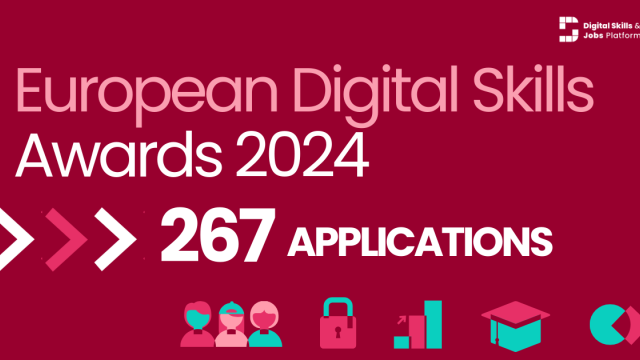Digital skills and displacement: digital skills and access to digital work as a central part of European refugee policies

Global population displacement is a key issue in our modern world with conflict and climate change forcing many people to leave their home regions or countries. Refugee populations are set to rise with the number of people in Europe who have been forcibly displaced or who are stateless projected to rise to 24.9 Million people in 2024 as a result of the ongoing Russian war of aggression in Ukraine alongside continued instability in the Middle East.
Digital skills, displacement and Europe
While questions and concerns about migration to the EU are frequently discussed in the political and media spheres, the share of refugees in the EU sits at just 1.5% compared to its total population. Although this is comparatively low compared with other regions in the world, supporting those affected by forced displacement is rightly at the forefront of many governmental and non-profit initiatives throughout Europe. This has especially been the case as the realities of displacement become ever more present with the war in Ukraine leading to the largest displacement due to armed conflict seen in Europe since World War Two. In the digital age, digital solutions and support mechanisms are increasingly a key part of these policies, services and charitable activities.
"The development of digital technology, similar to discussions about migration, is often seen through a lens of fear of the unknown and scaremongering. Recent debates about AI hinge on the premise of a ‘fifth industrial revolution’ which will force people out of work and require them to reskill. It’s clear that with the pace of the digital revolution, everyone in any type of work must be ready to embrace change and lifelong learning when it comes to digital skills".
For those who have already been forced out of work due to displacement, the push to upskill and re-skill comes even faster. In addition, while many of us who work in office jobs have seen the convenience that working from home can bring, remote work brings additional benefits to transitory populations.
"If people are based in conflict zones, remote work can provide them the opportunity to keep working even in fragile contexts, and to continue work even as they are displaced (as long as internet and electricity are available). Remote work also offers the benefit of flexibility in case of return and to single parents or those with childcare obligations and may struggle to work outside the home."
Digital infrastructure as an essential part of support initiatives for displaced people
When we consider support for people displaced by conflict, we often jump straight to the essentials of housing, clothing and most importantly safety. However digital connectivity and infrastructure is also vital and something that needs to be integrated into our basic services. It allows people to connect with loved ones but also to engage with their local community, employment opportunities and to continue learning.
Access to digital equipment is key, as are digital upskilling opportunities. There are also many people who are displaced by conflict who are highly digitally skilled and who can and should be supported to take a role in the upskilling of others in their displacement community and in the host community. In fact, at Humans in the Loop we work with many refugee-led organisations, such as Subul, which bring the digital skills of people displaced by conflict to the forefront and foster digital innovation both in areas of ongoing displacement and within the EU.
Building diversity and inclusion into AI systems and the IT sphere
It has become increasingly clear that in order to create ethical AI which does not perpetuate stereotypes and discrimination, all voices must be represented in the development of these models.
"It is only through the opening up of the IT sphere and ensuring that it equally represents our communities that we can create equitable technology and a digital world that represents the core values of the EU, freedom, democracy and human dignity. This must include people who have been displaced to Europe, both those who already possess the skills but also those who can contribute at an entry level position such as in the field of data labelling and validation".
About the author
Hester Gartrell is Chief Impact Officer and Interim Director at Humans in the Loop Foundation. Originally from the UK but living and working in Bulgaria, Hester has a MSc in Islamic and Middle Eastern Studies from the University of Edinburgh and an in-depth understanding of religious and cultural contexts in both the Middle East and Europe. In her previous roles, including at Birkbeck, University of London, Hester has developed and led a variety of programmes focusing on inclusive educational outreach for children and adults who face additional barriers
About Humans in the Loop
A case study of access to digital upskilling and digital work for people affected by conflict
Providing digital upskilling and remote work opportunities to people affected by conflict is at the heart of what Humans in the Loop does. Through their award-winning social enterprise, they offer digital upskilling opportunities and annotation work, a key facet of the development of AI models. Through this model, Humans in the Loop has supported people currently based in conflict zones, and those displaced to the EU, to access opportunities in the global digital economy. Humans in the Loop's mission not only aims to support people to be financially independent, but also to contribute to ethical AI and data for good. Providing access to our digital world and in turn, digital work is a vital part of European refugee policy and will only increase in importance as AI and digital technology develops.




